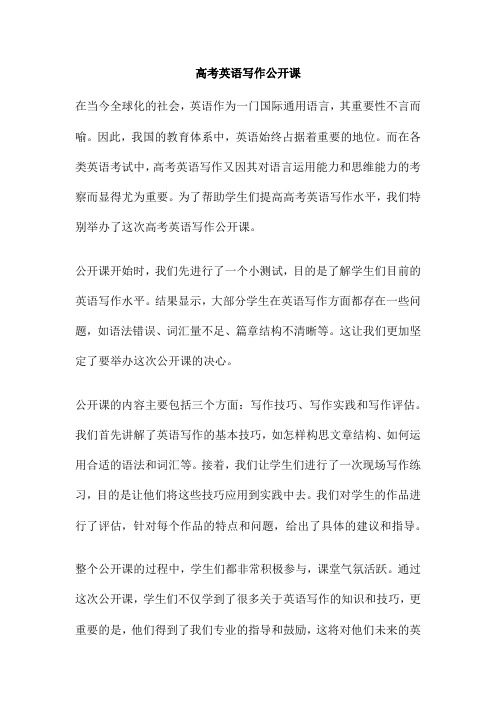高三英语公开课写作
Writing-高三英语写作课(新授课)-一节优秀的英语公开课【优质PPT】

7. (Much)To our (great) surprise, Xiao Ming knows everything.
8. Xiao Ming's knowing everything surprises us.
to simplify
9. Everything known by Xiao Ming, we are surprised.
1. Xiao Ming knows everything and we are very surprised.
2. We are very surprised that Xiao Ming knows everything.
3. That Xiao Ming knows everything surprises us/makes us
Varied sentence structures.
u All simple sentences, and the readers will feel bored. u All long and complex sentences, and the readers will feel tired. u Combination of long sentences and short ones, and the readers will feel
Step II: 点拨质疑 导学提升
To simplify
uHe decided that he would buy a digital camera online.
→He decided to buy a digital camera online.
uThe man who is talking with Mary is my brother.
高三英语写作公开课

Ⅲ Use proper linking words
Dear Editor, As a student reader, I am writing to talk about the English textbooks published by your house These books have many advantages.T_o__b_e_g_in__w_ith one of them is that we can find a variety of topics, such as science, culture and history. These topics, I think, are very popular with us students.
I realized Janet was a nice teacher only after I left school . Only after I left school did I realize Janet was a nice teacher
We can live in more comfortable and beautiful surroundings only in this way Only in this way can we live in more comfortable and beautiful surroundings
Chenjiale walked out of the classroom, followed by many girls
The kids were invited to the party and they were very excited
Invited to the party, the kids were very excited
高三英语作文公开课

高三英语作文公开课Possible essay:A Public Speaking Class in Senior High School。
As a senior high school student, I have taken many courses that are supposed to prepare me for college andlife beyond. However, none of them has been as challenging, rewarding, and fun as the public speaking class that I am currently taking. In this essay, I would like to share my experience of this class, its benefits, and some tips for becoming a better speaker.First of all, I must confess that I was not very excited about taking a public speaking class at first. I have always been a shy and introverted person, and the thought of standing in front of a group of people and speaking my mind made me nervous and insecure. However, as soon as I entered the class, I realized that my teacher and classmates were friendly, supportive, and diverse. Myteacher, Mrs. Smith, is a seasoned speaker and coach who has won many awards and accolades for her speeches. She is also a kind, patient, and humorous person who knows how to motivate and guide her students. My classmates are also a mix of personalities and backgrounds, ranging from the outgoing and confident ones to the quiet and reserved ones like me. However, we all share the same goal of improving our public speaking skills and overcoming our fears and weaknesses.The structure of the class is also well-designed and dynamic. We have a variety of activities and assignments that challenge us to think, research, organize, and deliver speeches on different topics and formats. For example, we have done impromptu speeches, persuasive speeches, informative speeches, group speeches, and even debates. We have also learned about the art of storytelling, the power of body language, the use of visual aids, and the ethics of communication. We have watched and analyzed famous speeches by Martin Luther King Jr., Barack Obama, Malala Yousafzai, and other inspiring leaders. We have received feedback and critiques from our teacher and peers, and we have learnedhow to give constructive feedback and critiques to others. We have also practiced listening and responding skills, as well as how to handle questions and challenges from the audience.The benefits of taking this class are numerous and invaluable. Firstly, I have become more confident and expressive in my speech and demeanor. I have learned how to control my nerves, breathe deeply, and use my voice and gestures effectively. I have also learned how to connect with my audience, engage their attention, and convey my message clearly and persuasively. Secondly, I have become more knowledgeable and curious about different topics and issues. I have learned how to research and analyze information from various sources, and how to synthesize and present it in a logical and coherent way. I have also learned how to appreciate different perspectives and cultures, and how to respect and tolerate different opinions and beliefs. Thirdly, I have become more social and empathetic in my interactions with others. I have learned how to listen actively, empathize with others' feelings and needs, and respond appropriately andrespectfully. I have also learned how to collaborate and cooperate with others in group projects, and how to appreciate and learn from their strengths and weaknesses.Lastly, I would like to share some tips for becoming a better speaker, based on my own experience and observation. Firstly, practice makes perfect. The more you practice speaking, the more comfortable and confident you will become. You can practice by speaking in front of a mirror, recording yourself, or speaking in front of a small group of friends or family members. Secondly, be yourself. Don't try to imitate someone else's style or personality, butfind your own voice and style that suits your personality and message. Thirdly, be prepared. Do your research, organize your ideas, and rehearse your speech before the actual presentation. This will help you feel more confident and in control. Fourthly, be aware of your body language and tone of voice. They can convey as much or more than your words, so make sure they match your message and intention. Finally, be open to feedback and critique. They can help you improve your weaknesses and build on your strengths. Don't take them personally, but use them asopportunities to learn and grow.In conclusion, I am grateful for taking this public speaking class in senior high school, and I would recommend it to anyone who wants to improve their communicationskills and confidence. It has challenged me, rewarded me, and inspired me to become a better speaker and person. I hope that my experience and tips can also benefit others who are on the same journey.。
高三英语写作公开课课件(共26张)

因为对中国传统艺术非常感兴趣并且受到过良好训练,所以我非常了解中国画。我不仅可以给游客解说画美在哪里,还可以讲述他们背后的故事。
+
补充细节:
语言表达:
连词成句:
+
traditional Chinese art;
I am deeply interested in traditional Chinese art and I have received a good education in art, so I have a good knowledge of Chinese paintings.
基本得体
基本清楚
6-10
漏掉主要要点
贫乏
错误较多,影响理解
不得体
混乱
1-5
未能传达任何信息,写的内容与要求无关
要点完整;语言准确且多样;结构清晰; 逻辑连贯交际得体书写美观
好作文标准:
好作文的写作步骤 (写作七步法)
审 题体裁时态人称要点
列提纲结构要点关键词
补充细节
语言表达准确地道词汇句式
连词成句+过渡词逻辑连贯流畅连句成篇
(2019 全国1卷)
体裁人称时态 要求
一般现在时
120左右
gallery, art center
应用文(申请信)
第一人称
A Chinese painting exhibition其它相关表达:中国画Chinese paintings, traditional Chinese art, the artworks.
Para.1Para.2Para.3
个人优势+能做的事(具体说明能胜任此工作的理由,3个优势)
高中英语写作公开课

高中英语写作公开课一、写作技巧介绍1. 审题:认真阅读题目,明确写作要求,理解文章主题和要点。
2. 构思:在头脑中形成文章的基本框架,包括开头、主体和结尾。
3. 列出要点:将文章的主要观点和细节列出来,有助于组织文章内容。
4. 句式变化:使用不同的句式和表达方式,避免句式单一,增加文章可读性。
二、写作准备1. 收集素材:查阅相关资料,了解与主题相关的背景信息。
2. 确定文体:根据题目要求,确定文章文体,如记叙文、议论文等。
3. 语言准备:积累一些常用的短语和句型,提高语言表达水平。
三、文章结构规划1. 开头:用简洁明了的语言引入主题,引起读者兴趣。
2. 主体:根据文章主题和要点,组织段落内容,进行论证或叙述。
3. 结尾:总结全文,强调主题,留下深刻印象。
四、语言表达提升1. 使用高级词汇:尝试使用一些高级词汇,提高文章质量。
2. 句式变化:运用不同的句式和表达方式,使文章更加生动有趣。
3. 使用修辞手法:运用比喻、拟人等修辞手法,增强文章表现力。
五、常见错误纠正1. 语法错误:检查句子结构是否正确,时态、语态是否恰当。
2. 拼写错误:认真检查单词拼写,避免出现拼写错误。
3. 逻辑错误:检查段落之间的逻辑关系是否合理,内容是否连贯。
六、实例分析与点评1. 选择一篇典型范文进行讲解,分析其优点和不足。
2. 对学生作品进行点评,指出其存在的问题和改进方向。
3. 鼓励学生互相学习,取长补短。
七、学生实践与互评1. 学生分组进行写作实践,限时完成一篇短文。
2. 学生之间互相点评作品,提出改进意见和建议。
3. 教师对点评情况进行总结和反馈,帮助学生进一步提高写作水平。
高中英语写作公开课教案

高中英语写作公开课教案Module 1: Introduction to High School English WritingI. ObjectivesBy the end of the lesson, students will be able to:1. Identify the basic English writing skills.2. Understand the importance of effective and creative writing.3. Explore the writing process – pre-writing, drafting, revising, editing, and publishing.II. Materials1. Whiteboard and markers2. Worksheets3. Textbooks4. Computer with internet accessIII. ProcedureA. Introduction (5 minutes)1. Welcome the students to the classroom and introduce yourself.2. Explain the goal of the lesson – to understand the writing process and learn the basics of English writing.B. Pre-writing Activities (20 minutes)1. Ask the students to list out different types of writing, such as persuasive, expository, descriptive, narrative, etc.2. Discuss the purpose of each type of writing and its importance to Englishwriting.3. Introduce the writing process steps – pre-writing, drafting, revising, editing and publishing.4. Divide the students into groups and give each group a sample essay to analyze.5. Ask the students to discuss the essay and identify the writing techniques used.C. Drafting (20 minutes)1. Ask the students to brainstorm ideas on a topic of their choice.2. Give the students guidance on how to formulate an outline based on their ideas.3. Direct the students to create a framework for their essay using their outline.D. Revising (20 minutes)1. Ask the students to share their drafts with the class for peer review.2. Direct the students to look for grammar and spelling errors, sentence structure, and ideas.3. Ask the students to suggest changes and improvements based on feedback from peers and the teacher.E. Editing (15 minutes)1. Provide the students with worksheets that contain tips on how to edit their essays.2. Ask the students to use the worksheets to edit their drafts.F. Publishing (10 minutes)1. Ask the students to share their essays with the class.2. Ask the students to provide feedback to their peers on the essays.3. Instruct the students to finalize their essays by making any necessary changes.G. Conclusion (5 minutes)1. Thank the students for their participation.2. Summarize the key points discussed in the lesson.3. Assign homework (if applicable).IV. AssessmentThe students will be assessed based on their participation in class activities and their ability to apply the writing process steps to their own essays.。
高考英语作文写作公开课PPT课件

What is the ideal length for an English composition in the college entrance examination? The ideal length for an English composition depends on the specific requirements of the exam, but generally, it should be between 150-250 words
Motivation and funding: Encourage students to continue in their writing practice and provide positive feedback to boost their confidence
Critique of language use: Assess the language proficiency of students and provide guidance on improving their vocabulary, grammar, and presence structure
Writing format guidance
Instrument students on the appropriate format for different types of writing, such as essays, letters, and narrativscriptive Composition
This type of composition is focused on describing a person, place, thing, or event in detail It requires the student to use rich and vivid language to create a sense of presence and importance
高考英语写作公开课

高考英语写作公开课在当今全球化的社会,英语作为一门国际通用语言,其重要性不言而喻。
因此,我国的教育体系中,英语始终占据着重要的地位。
而在各类英语考试中,高考英语写作又因其对语言运用能力和思维能力的考察而显得尤为重要。
为了帮助学生们提高高考英语写作水平,我们特别举办了这次高考英语写作公开课。
公开课开始时,我们先进行了一个小测试,目的是了解学生们目前的英语写作水平。
结果显示,大部分学生在英语写作方面都存在一些问题,如语法错误、词汇量不足、篇章结构不清晰等。
这让我们更加坚定了要举办这次公开课的决心。
公开课的内容主要包括三个方面:写作技巧、写作实践和写作评估。
我们首先讲解了英语写作的基本技巧,如怎样构思文章结构、如何运用合适的语法和词汇等。
接着,我们让学生们进行了一次现场写作练习,目的是让他们将这些技巧应用到实践中去。
我们对学生的作品进行了评估,针对每个作品的特点和问题,给出了具体的建议和指导。
整个公开课的过程中,学生们都非常积极参与,课堂气氛活跃。
通过这次公开课,学生们不仅学到了很多关于英语写作的知识和技巧,更重要的是,他们得到了我们专业的指导和鼓励,这将对他们未来的英语学习产生深远的影响。
这次高考英语写作公开课是一次非常成功的活动。
通过我们的努力,希望能帮助更多的学生们提高他们的英语写作水平,为他们的未来铺平道路。
高考英语概要写作公开课一、课程背景高考英语概要写作是考查学生英语综合运用能力的重要题型。
然而,许多学生在面对概要写作时,常常感到无从下手,得分率不高。
为了帮助学生提高概要写作水平,我们特别开设了这节公开课,为学生提供指导和帮助。
二、课程目标本节课旨在帮助学生:1、了解概要写作的基本概念和要求;2、学习如何快速阅读原文并抓住要点;3、掌握概括和表达的技巧;4、提高英语阅读和写作的综合能力。
三、课程内容1、概要写作的基本概念和要求本部分将介绍概要写作的定义、目的和要求,帮助学生了解概要写作的特点和注意事项。
